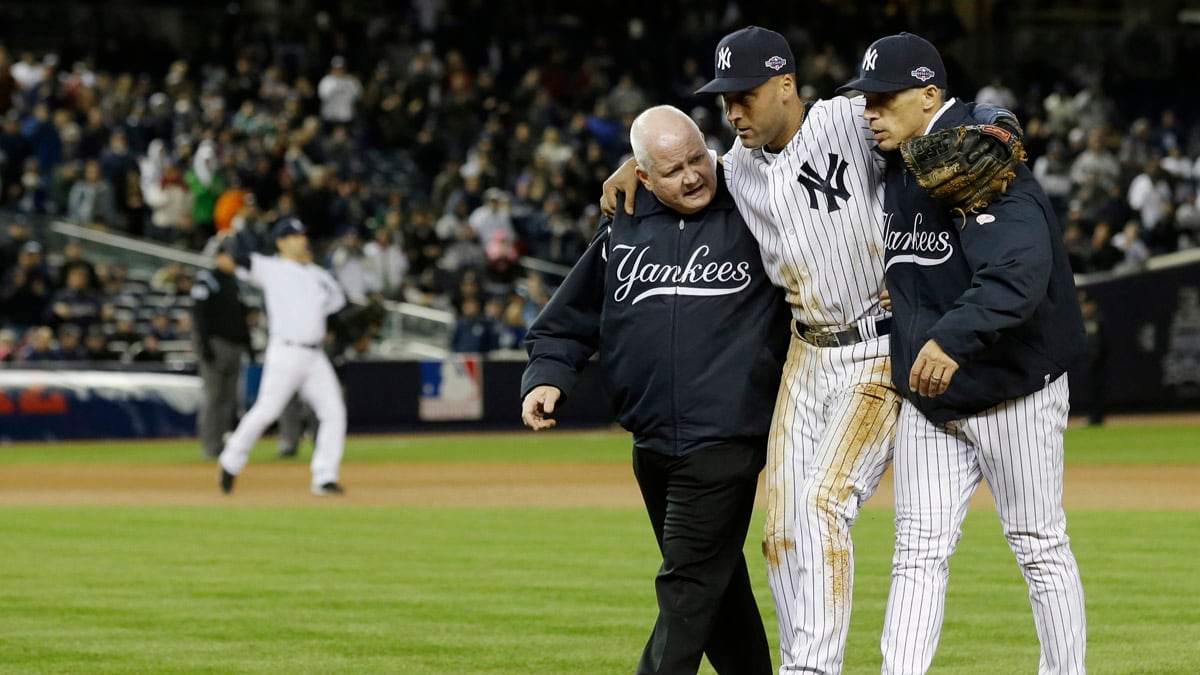There are the New York Yankees as a baseball team, and then there are the New York Yankees as an idea. In the first sense, Derek Jeter—an excellent ballplayer on a quite good team—undoubtedly deserves sympathy for the broken ankle he suffered Saturday that ended his post-season and disheartened Yankees fans who for decades have now have relied on the captain. But for baseball fans of the other 29 teams, it’s been hard not to cheer the misfortune of the Bronx Bombers, with their pinstriped “class,” a synthetic blend of mystique and aura bottled and sold at obscene markups.
As a team, the 2012 Yankees are like most teams, a collection of achy-jointed oldsters, beefy goofs with ill-advised tattoos and grooming choices, devout androids, and hard-working professionals whose faint personalities have been blanked by the intensity of will that’s required to become a big league athlete; almost all of these players, naturally, have been made blindingly, impossibly rich. There are die-hards in the stands cheering and suffering and battling, mostly good-naturedly, for the giveaways poompf-ed up to their seats by some brand-sponsored T-shirt cannon. There’s a plutocrat seething and glowering away in the owner’s box, and seated near him a general manager growing progressively more nervous. This is all pretty familiar to most fans, not so different from teams you've never bothered to hate, and even the team you love.
But that’s not all the Yankees are, or represent. This is where it gets complicated, and why the responses to the season-ending injury suffered by ur-Yankee Derek Jeter on Saturday night are so shot through with schadenfreude and sorrow. One of the better baseball players of his generation rolled and fractured his ankle, ending his season and dimming his team’s hopes for a World Series victory. Taken on its own, this is simply what it is—a bummer, a cruel twist in a game defined by them, a challenge for a team that can come together or fall apart, depending. But it’s tough to take Jeter’s injury on its own, in part because he is Derek Jeter but mostly because his team is the Yankees—he wouldn’t be Derek Jeter, as we’ve come to know him, if he wasn’t pinstriped.
And the Yankees are not just a team—they are now, maybe more than they have ever been during their generations-long reign over baseball, an idea.
For Yankees fans, that idea is an ideal: for them, the Yankees are righteous champions, a team that does things the right way, and succeeds and succeeds and succeeds because they know how to win and are willing to do what’s required to do it. For most everyone else, though, even those who resist the political arithmetic of 99 Percent and One Percent, the Yankees are frankly odious—the richest and most unaccountable team in baseball, able and all top eager to throw the GDP of an Eastern European nation at luxury-priced ballplayers, then do it again when those solid-gold stars start to tarnish.

Despite or perhaps because of that vast cash advantage (they have effectively colluded with the Mets and Major League Baseball to keep a market big enough for three or even four teams divvied up between the two of them), the Yankees have embraced a uniquely and unapologetically craven way of doing business: outlandish ticket prices rendered more so by vague fees and surcharges; the relentless and shameless pursuit of public subsidy in the construction of the new Yankee Stadium; picayune villainies like allegedly conspiring (improbably and hilariously with both the Dallas Cowboys and Goldman Sachs) to swipe hundreds of thousands of dollars in service charges from Yankee Stadium hot-dog slingers.
All of which is business as usual, more or less. What makes it infuriating is the corporation’s hard sell on fans’ loyalties and allegiance, and those fans' insistence in turn that everyone recognize just how admirable it is that a baseball organization could be this good at being a baseball organization, that all the down-cushion comfort and self-delighted excess is, by definition and birthright, richly deserved.
This is a classic One Percent miscalculation, of course. As common as it’s become to hear contemporary billionaires huffing about how cruelly and unjustly Americans undervalue the over-class, it’s still inevitably joined with an insistence that they earned their platinum-dipped impunity, as though this man worked, say, 50 million times harder than that one, or this baseball team was simply more august and deserving of October glory year after year.
In this context, it’s easy to look at any misfortune that befalls the Yankees as we might look at news that Donald Trump has sinusitis, or that a family of eels have taken up residence in the pool at Jamie Dimon’s vacation home. This is why so many fans have responded to the chorus of Yankees fans mourning Jeter’s loss by tuning up a symphony of the world’s smallest violins and having it perform Cee-Lo Green’s “Fuck You.”
This is, inarguably, a small-minded and small-hearted way to look at things, even by the usual silly standards for sports fans. Derek Jeter, for all the whole milk dullness of his personality, is also a person with an injury; cheering his misfortune is churlish and casually uncool in all the ways it would be if the unfortunate victim were someone other than Derek Jeter, centimillionaire success story and serial starlet-dater. More than that, Jeter’s an undeniably great baseball player—not much of a fielder anymore, true, but unflappable and world-historically tough and far better at this impossible sport than he has any right to be at the age of 38. The Captain Clutch mythos that surrounds Jeter is cloying, and his years of all-caps adoration in the media is overstated and ridiculous. But Jeter remains a brilliant, era-defining star, with or without the pinstripe-y pomp and 24/7 fog machine treatment given to Yankees stars. The playoffs will be diminished without him—maybe not less interesting, given the ways in which his injury shakes up the odds in the American League Championship Series between the Yankees and Tigers, but lesser in other ways.
As a baseball team, the Yankees have been dealt a blow, and it will be interesting to see how they respond. But the Yankees are not just a baseball team, not by a long shot. It’s possible to recognize Jeter’s worth and very real greatness and mourn his absence for the rest of October, while also recognizing that this particular misfortune couldn’t have befallen a more deserving organization.






